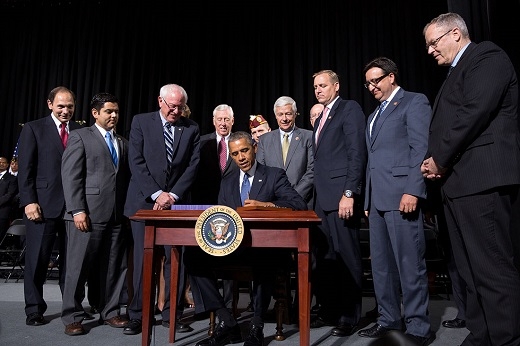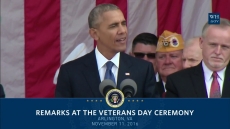Health Care
The Administration is focused on providing the resources and flexibility needed to make sure every veteran has access to the care that they were promised.

Improving Access to Care
The President and the VA are committed to ensuring that veterans have access to the timely, quality health care that they have earned and deserve.

President Barack Obama signs H.R. 3230, the Veterans' Access, Choice, and Accountability Act of 2014, at Fort Belvoir, Va., Aug. 7, 2014. The bill provides the Department of Veterans Affairs the resources to improve access and quality of care for veterans. (Official White House Photo by Pete Souza)
In August 2014, the President signed into law the Veterans’ Access to Care through Choice, Accountability, and Transparency Act of 2014, which will expand survivor benefits and educational opportunities and improve care for victims of sexual assault and veterans struggling with traumatic brain injuries. The law also addresses:
-
Accountability
As the President has made clear, those responsible for manipulating or falsifying records at the VA must be held accountable. The VA established an independent accountability review board to review employee actions and hold individuals accountable where there is misconduct. -
Protections for Whistleblowers
The VA has reconfirmed and strengthened its commitment to protections for whistleblowers and the new leadership has been clear that retaliation against, or intimidation of, whistleblowers will not be tolerated. -
New Commitment to Transparency
For the first time ever, the VA is providing the public with regular, updated information on the quality and timeliness of VA care. This is more information that any private hospital in the United States currently provides. -
Recruiting the Best Medical Professionals
Under Secretary McDonald’s leadership, the VA is launching a new recruiting campaign designed to help attract the best and the brightest medical professionals to work in the VA system, and to fill the shortages in health care workers, including doctors and nurses, at many VA facilities.

Ensuring Veterans Benefits
Improving quality and reducing the length of time it takes to process disability claims is integral to the Administration's mission of providing benefits the care and benefits they have earned and deserve in a timely, accurate, and compassionate manner. Some of the most important initiatives to this important mission include:
-
Eliminating the Disability Claims Backlog
The VA has decreased the backlog by 88 percent since its peak in March 2013. The VA has implemented additional changes to the Veterans Benefits Management System to increase automation and integration, system-wide. Such changes helped the VA complete a record breaking 1.4 million claims in the last fiscal year. -
Eliminating the Backlog of Survivors’ Claims
Eliminating the backlog of survivors’ dependency and indemnity compensation claims. The VA has streamlined the processing procedures for benefits paid to survivors of Veterans who die in service or as a result of a service connected disability. In just 18 months, this backlog was reduced by 88 percent. -
Improvement of Claims Processing Accuracy
The VA is committed to providing high-quality, accurate claims decisions for our nation's veterans, including by redesigning policies and procedures, continuing to enhance training for claims processors, and utilizing the most advanced information technology.
Mental Health
On August 26, 2014, the President announced 19 new executive actions to improve the mental health of service members, veterans, and their families, which builds on the progress the Administration has made since the President’s 2012 (Mental Health) Executive Order. In response to the 2012 Executive Order, VA has increased its mental health staffing, expanded the capacity of the Veterans Crisis Line, and enhanced its partnerships with community mental health providers; DoD and VA worked to increase suicide prevention awareness and, DoD, VA and the National Institutes of Health jointly developed the National Research Action Plan on military and veterans mental health to better coordinate federal research efforts.
The new mental health executive actions will fall under the following six categories:
- Improving Service Members’ Transition from DoD to VA and Civilian Health Care Providers: DoD will now be automatically enrolling all service members leaving military service who are receiving care for mental health conditions in the Department’s inTransition program, through which trained mental health professionals help these individuals transition to a new care team in VA. Currently, service members must be specifically referred to inTransition by their DoD provider or seek out the program on their own. Additionally, VA will implement a new policy to ensure that recently discharged service members enrolling in the VA health care system maintain access to mental health medication prescribed by an authorized DoD provider regardless of whether the medication is currently on VA’s formulary, unless the health care provider identifies a specific safety or clinical reason to make a change.
- Improving Access and Quality of Mental Health Care at DoD and VA: VA will pilot the expansion of mental health peer support to veterans being treated in primary care settings. In addition, DoD has initiated action to do what they can under its authority and will continue to work with Congress to take action to bring TRICARE, DoD’s health care coverage, up to full mental health and substance use disorder parity, meaning benefits for these conditions are generally on par with benefits for medical/surgical conditions.
- Continuing our Commitment to Improve Treatments for Mental Health Conditions including PTSD. In support of the National Research Action Plan on military and veterans mental health, the DoD and the National Institutes of Health are launching a longitudinal project focused on the early detection of suicidality, PTSD, and long term effects of TBI, and other related issues in service members and veterans. VA is launching a $34.4 million suicide prevention study involving 1800 veterans at 29 VA hospitals. In support of the President’s BRAIN Initiative, the Defense Advanced Research Projects Agency (DARPA) is announcing a new $78.9 million research program to develop minimally-invasive neurotechnologies that may help treat many diseases, including PTSD. In addition, the White House announced that this fall it will host the White House BRAIN conference, including a focus on PTSD and TBI.
- Raising Awareness About Mental Health and Encouraging Individuals to Seek Help: VA and DoD are expanding their suicide prevention and mental health training for healthcare providers, chaplains, and employees who work directly with veterans.
- Improving Patient Safety and Suicide Prevention: VA and DoD are taking action to provide new opportunities for servicemembers, veterans, and their families to give back unwanted medications, and thereby help reduce the opportunities for abuse. The Departments are also taking action to encourage firearm safety and reduce the risk of overdose.
- Strengthening Community Resources for Service Members, Veterans, and Their Families: While all individuals can experience mental health conditions, service members, veterans, and their families may experience stressors unique to their time in the military. Understanding military culture and the experiences of service members and their families can help community providers best serve these individuals. DoD and VA will disseminate its existing military cultural competency training to 3,000 community mental health providers during FY 2015.
Learn more about the President's Executive Actions
Cross-Agency Priority Goal to Improve Mental Health
In 2012, President Obama directed the Departments of Defense, Veterans Affairs (VA) and Health and Human Services (HHS) to coordinate with other federal agencies to ensure that veterans, service members, and their families receive the mental health services and support they need. These steps include:
- Strengthening suicide prevention efforts across the force and in the veteran community
- Building partnerships between VA and community mental health providers
- Increasing the number of VA mental health providers
- Promoting mental health research and development of more effective treatment methodologies
Building on these efforts to improve mental health outcomes for service members and veterans, the Administration announced a new Cross-Agency Priority Goal (CAP-G) in 2013 to improve mental health outcomes for service members, veterans, and their families over a three-year period.
The CAP-G advances efforts of VA, DoD and HHS to coordinate and direct improvements to a complex continuum of care that provides prevention, diagnosis, referral, and treatment capabilities across a range of behavioral health services, including community-based providers.

